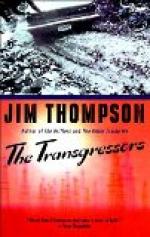Trueman is looked upon by all the miners of the region as a part and parcel of the law, and all law is regarded by them as a thing made to oppress the poor and aggrandize the wealthy.
A simple investigation on the eve of the present battle has placed in the hands of the young lawyer ammunition which will rout the enemy on the first volley.
But such an enemy! Above all things, Harvey Trueman is a magnanimous foe. Now that he has his case won, he feels half humiliated. In the court room, occupying a front seat while she awaits the arrival of her lawyer, sits the widow of Marcus Braun, the Magyar miner.
The miner was killed in Shaft Fifteen of the Paradise Company, which is three miles down the river from the wagon bridge at Wilkes-Barre. Standing at the bottom of the shaft when an elevator cage fell, upon which were two loaded coal cars, he was crushed to a pulp. His widow is suing for damages for the death of her husband. In the front seat with her, in the court room, is her five-year-old boy, whom she must support, perhaps by taking boarders at the mines, if the mine superintendent will permit her to go in debt for the rent of a house in case her litigation against the company is not successful.
True, the rope by which the cage had been lifted and lowered had worn thin, and the foreman had warned the superintendent the morning of the accident that a new one was needed. But the poor Magyar at the bottom of the shaft did not know it. He had in no way contributed to the negligence which brought about his death. He knew his work was perilous. In the law, it is a question whether or not the case can be successfully defended by the coal company.
Trueman’s trip to the Clerk’s office has been for the purpose of ascertaining the miner’s standing with reference to his citizenship at the time of his death. With his experience in the practice, the lawyer surmised that the Magyar was never naturalized. If he was not naturalized, his widow has no standing in the court where the suit has been brought. In that case, it belongs to the Federal Court, and his widow and orphan, as well as the impecunious lawyer who has taken the widow’s case on a contingent fee, will not have the means nor the fortitude to begin action in the higher court.
Trueman discovers after a few moments of investigation in the Clerk’s office that his suspicion is well founded. The miner had never taken out naturalization papers.
Cruel? In the concrete, perhaps. The law is made for the multitude.
“It is a legitimate defense!” Trueman murmurs to himself, as he passes down the stairs. “The Magyar bore none of the burdens of citizenship. Neither should he or his, share in the protection which the State of Pennsylvania affords her citizens.”
“Will the Magyar’s widow get anything?” asks O’Connor, one of the half-Irish, half-Italian miners, whose elbow Trueman brushes as he walks towards the court room.




